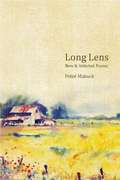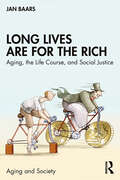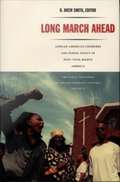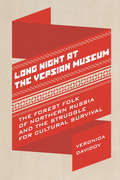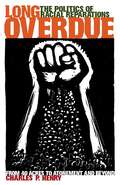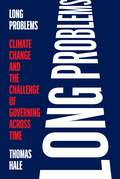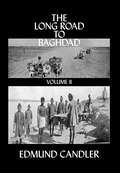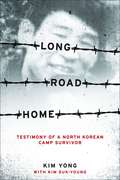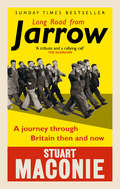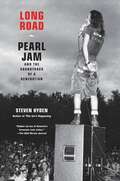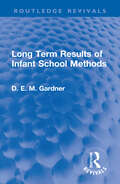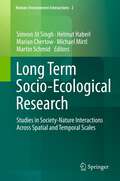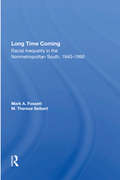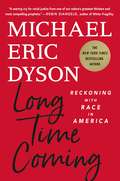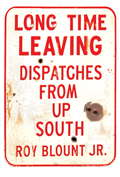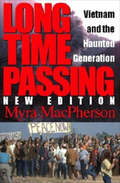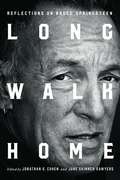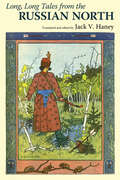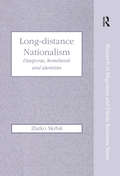- Table View
- List View
Long Lens: New and Selected Poems (American Poets Continuum)
by Peter Makuck"Peter Makuck sees through the detritus of daily life to what matters. . . . It’s that essence that lives deep down in things, looked for in people, sea- and landscapes, and creatures, that lifts the quotidian toward the marvelous, and animates this selection of poems from four decades."—Brendan GalvinFrom "Long Lens":Folding laundry, I can see our clotheslinewaving its patches of color like the flagof a foreign country where I had happily livedin a small clapboard house surrounded by pines.I can hear my mother in her strong accentsaying she didn’t want a dryereven when we could finally afford one—Our sheets won’t smell of trees and sunlight anymore.Long Lens represents forty years of Peter Makuck’s work, including twenty-five new poems. With precise language, Makuck’s imagery evokes spiritual longing, love, loss, violence, and transcendence. His subjects include the aftermath of the 1970 killings at Kent State University; scuba diving on an offshore shipwreck; flying through a storm in a small plane; rescuing a boy caught in a riptide; and lucid observations of spinner sharks, a gray fox, a spider, and a pelican tangled in a fishing line.Peter Makuck taught at East Carolina University from 1976 to 2006, where he founded Tar River Poetry. He was 2008 Lee Smith Chair in Creative Writing at North Carolina State University. Winner of the Brockman Award and the Charity Randall Citation, he lives on Bogue Banks, one of North Carolina’s barrier islands.
Long Live Queer Nightlife: How the Closing of Gay Bars Sparked a Revolution
by Amin GhazianiIt&’s closing time for an alarming number of gay bars in cities around the globe—but it&’s definitely not the last danceIn this exhilarating journey into underground parties, pulsating with life and limitless possibility, acclaimed author Amin Ghaziani unveils the unexpected revolution revitalizing urban nightlife.Far from the gay bar with its largely white, gay male clientele, here is a dazzling scene of secret parties—club nights—wherein culture creatives, many of whom are queer, trans, and racial minorities, reclaim the night in the name of those too long left out. Episodic, nomadic, and radically inclusive, club nights are refashioning queer nightlife in boundlessly imaginative and powerfully defiant ways.Drawing on Ghaziani&’s immersive encounters at underground parties in London and more than one hundred riveting interviews with everyone from bar owners to party producers, revelers to rabble-rousers, Long Live Queer Nightlife showcases a spectacular, if seldom-seen, vision of a queer world shimmering with self-empowerment, inventiveness, and joy.
Long Lives Are for the Rich: Aging, the Life Course, and Social Justice (Aging and Society)
by Jan BaarsLong Lives Are for the Rich is the title of a silent ominous program that affects the lives of millions of people. In all developed countries disadvantaged and, especially, poor people die much earlier than the most advantaged. During these shorter lives they suffer ten to twenty years longer from disabilities or chronic disease. This does not happen accidentally: health inequalities – including those between healthy and unhealthy life styles – are mainly caused by social inequalities that are reproduced over the life course. This crucial function of the life course has become painfully visible during its neoliberal reorganization since the early 1980s. Studies about aging over the life course, from birth to death, show the inhumane consequences as people get older. In spite of the enormous wealth that has been piled up in the US for a dwindling percentage of the population, there has been growing public indifference about the needs of those in jobs with low pay and high stress, but also about citizens from a broad middle class who can hardly afford high quality education or healthcare. However, this ominous program affects all: recent mortality rates show that all Americans, including the rich, are unhealthier and dying earlier than citizens of other developed countries. Moreover, the underlying social inequalities are tearing the population apart with nasty consequences for all citizens, including the rich. Although the public awareness of the consequences has been growing, neoliberal policies remain tempting for the economic and political elites of the developed world because of the enormous wealth that is flowing to the top. All this poses urgent questions of social justice. Unfortunately, the predominant studies of social justice along the life course help to reproduce these inequalities by neglecting them. This book analyzes the main dynamics of social inequality over the life course and proposes a theory of social justice that sketches a way forward for a country that is willing to invest in its greatest resource: the creative potential of its population.
Long Lives Are for the Rich: Aging, the Life Course, and Social Justice (ISSN)
by Jan BaarsLong Lives Are for the Rich is the title of a silent ominous program that affects the lives of millions of people. In all developed countries disadvantaged and, especially, poor people die much earlier than the most advantaged. During these shorter lives they suffer ten to twenty years longer from disabilities or chronic disease. This does not happen accidentally: health inequalities – including those between healthy and unhealthy life styles – are mainly caused by social inequalities that are reproduced over the life course. This crucial function of the life course has become painfully visible during its neoliberal reorganization since the early 1980s. Studies about aging over the life course, from birth to death, show the inhumane consequences as people get older. In spite of the enormous wealth that has been piled up in the US for a dwindling percentage of the population, there has been growing public indifference about the needs of those in jobs with low pay and high stress, but also about citizens from a broad middle class who can hardly afford high quality education or healthcare. However, this ominous program affects all: recent mortality rates show that all Americans, including the rich, are unhealthier and dying earlier than citizens of other developed countries. Moreover, the underlying social inequalities are tearing the population apart with nasty consequences for all citizens, including the rich. Although the public awareness of the consequences has been growing, neoliberal policies remain tempting for the economic and political elites of the developed world because of the enormous wealth that is flowing to the top. All this poses urgent questions of social justice. Unfortunately, the predominant studies of social justice along the life course help to reproduce these inequalities by neglecting them. This book analyzes the main dynamics of social inequality over the life course and proposes a theory of social justice that sketches a way forward for a country that is willing to invest in its greatest resource: the creative potential of its population.
Long Lost Blues: Popular Blues in America, 1850-1920 (Music in American Life)
by Peter C. MuirMamie Smith's 1920 recording of ""Crazy Blues"" is commonly thought to signify the beginning of commercial attention to blues music and culture, but by that year more than 450 other blues titles had already appeared in sheet music and on recordings. In this examination of early popular blues, Peter C. Muir traces the genre's early history and the highly creative interplay between folk and popular forms, focusing especially on the roles W. C. Handy played in both blues music and the music business. Long Lost Blues exposes for the first time the full scope and importance of early popular blues to mainstream American culture in the early twentieth century. Closely analyzing sheet music and other print sources that have previously gone unexamined, Muir revises our understanding of the evolution and sociology of blues at its inception.
Long March Ahead: African American Churches and Public Policy in Post-Civil Rights America
by R. Drew SmithAnalyzing the extensive data gathered by the Public Influences of African American Churches project, which surveyed nearly two thousand churches across the country, Long March Ahead assesses the public policy activism of black churches since the civil rights movement. Social scientists and clergy consider the churches' work on a range of policy matters over the past four decades: affirmative action, welfare reform, health care, women's rights, education, and anti-apartheid activism. Some essays consider advocacy trends broadly. Others focus on specific cases, such as the role of African American churches in defeating the "One Florida" plan to end affirmative action in college admissions and state contracting or the partnership forged between police and inner-city black ministers to reduce crime in Boston during the 1990s. Long March Ahead emphasizes the need for African American churches to complement the excellent work they do in implementing policies set by others by getting more involved in shaping public policy. The contributors explore the efficacy of different means of public policy advocacy and social service delivery, including faith-based initiatives. At the same time, they draw attention to trends that have constrained political involvement by African American churches: the increased professionalization of policy advocacy and lobbying, the underdevelopment of church organizational structures devoted to policy work, and tensions between religious imperatives and political activism. Long March Ahead takes an important look at the political role of African American churches after the great policy achievements of the civil rights era. Contributors Cathy J. Cohen Megan McLaughlin Columba Aham Nnorum Michael Leo Owens Desiree Pedescleaux Barbara D. Savage R. Drew Smith Emilie Townes Christopher Winship
Long Night at the Vepsian Museum: The Forest Folk of Northern Russia and the Struggle for Cultural Survival
by Veronica DavidovThis book takes readers to the village of Sheltozero in northern Russia. It highlights a tiny community of indigenous people called Veps, known colloquially as "the forest folk" for their intense closeness and affiliation with the forests in their ancestral territories. Davidov uses a tour of the local museum to introduce a cast of human and non-human characters from traditional Vepsian culture, while journeying through various eras under Russian, Finnish, Soviet, and post-Soviet rule. In the process, she explores how contemporary political struggles mesh with traditional beliefs, illustrating how Veps make meaning of their history and unfolding future. A documentary entitled Museum Night is available for instructors who wish to incorporate it into their teaching.
Long Overdue: The Politics of Racial Reparations
by Charles P. HenryAn investigation of America’s failure to atone for the wrongs of slaveryEver since the unfulfilled promise of “forty acres and a mule” after the Civil War, America has consistently failed to compensate Black Americans for the wrongs of slavery. Exploring why America has struggled to confront the issue of racial injustice, Long Overdue provides a history of the racial reparations movement and shows why it is more relevant now than ever.Through an examination of Americans’ unwillingness to address economic injustice, Charles P. Henry crafts a skillful moral, political, economic, and historical argument for African American reparations, focusing on successful political cases. In the wake of successes in South Africa and New Zealand, new models for reparations have found traction in a number of American cities and states, from Dallas to Baltimore and Virginia to California. By looking at other dispossessed groups—Native Americans, Holocaust survivors, and Japanese internment victims in the 1940s—Henry shows how some groups have won the fight for reparations, and explores new ways forward for Black Americans. From Hurricane Katrina to Hurricane Harvey, the events of the 21st century continue to show that the legacy of racial segregation and economic disadvantage is never far below the surface in America. As the issue of reparations is brought to the national stage by figures such as Ta-Nehisi Coates and Kamala Harris, Long Overdue provides a must-read survey of the political and legislative efforts made toward reparations over the course of American history, and offers a new path toward establishing equality for all Black Americans.
Long Problems: Climate Change and the Challenge of Governing across Time
by Thomas HalePolitical strategies for tackling climate change and other &“long problems&” that span generationsClimate change and its consequences unfold over many generations. Past emissions affect our climate today, just as our actions shape the climate of tomorrow, while the effects of global warming will last thousands of years. Yet the priorities of the present dominate our climate policy and the politics surrounding it. Even the social science that attempts to frame the problem does not theorize time effectively. In this pathbreaking book, Thomas Hale examines the politics of climate change and other &“long problems.&” He shows why we find it hard to act before a problem&’s effects are felt, why our future interests carry little weight in current debates, and why our institutions struggle to balance durability and adaptability. With long-term goals in mind, he outlines strategies for tilting the politics and policies of climate change toward better outcomes.Globalization &“widened&” political problems across national boundaries and changed our understanding of politics and governance. Hale argues that we must make a similar shift to understand the &“lengthening&” of problems across time. He describes tools and strategies that can, under certain conditions, allow policymakers to anticipate future needs and risks, make interventions that get ahead of problems, shift time horizons, adapt to changing circumstances, and set forward-looking goals that endure. As the climate changes, politics must, too. Efforts to solve long-term problems—not only climate change but other issues as well, including technology governance and demographic shifts—can also be a catalyst for a broader institutional transformation oriented toward the long term. With Long Problems, Hale offers an essential guide to governing across time.
Long Road Baghdad: Volume 2
by CandlerFirst published in 2006. Routledge is an imprint of Taylor & Francis, an informa company.
Long Road Home: Testimony of a North Korean Camp Survivor
by Yong KimKim Yong shares his harrowing account of life in a labor camp-a singularly despairing form of torture carried out by the secret state. Although it is known that gulags exist in North Korea, little information is available about their organization and conduct, for prisoners rarely escape both incarceration and the country alive. Long Road Home shares the remarkable story of one such survivor, a former military official who spent six years in a gulag and experienced firsthand the brutality of an unconscionable regime. As a lieutenant colonel in the North Korean army, Kim Yong enjoyed unprecedented privilege in a society that closely monitored its citizens. He owned an imported car and drove it freely throughout the country. He also encountered corruption at all levels, whether among party officials or Japanese trade partners, and took note of the illicit benefits that were awarded to some and cruelly denied to others. When accusations of treason stripped Kim Yong of his position, the loose distinction between those who prosper and those who suffer under Kim Jong-il became painfully clear. Kim Yong was thrown into a world of violence and terror, condemned to camp No. 14 in Hamkyeong province, North Korea's most notorious labor camp. As he worked a constant shift 2,400 feet underground, daylight became Kim's new luxury; as the months wore on, he became intimately acquainted with political prisoners, subhuman camp guards, and an apocalyptic famine that killed millions. After years of meticulous planning, and with the help of old friends, Kim escaped and came to the United States via China, Mongolia, and South Korea. Presented here for the first time in its entirety, his story not only testifies to the atrocities being committed behind North Korea's wall of silence but also illuminates the daily struggle to maintain dignity and integrity in the face of unbelievable hardship. Like the work of Solzhenitsyn, this rare portrait tells a story of resilience as it reveals the dark forms of oppression, torture, and ideological terror at work in our world today.
Long Road from Jarrow: A journey through Britain then and now
by Stuart MaconieThe Sunday Times Bestseller'A tribute and a rallying call' - GuardianThree and half weeks. Three hundred miles. I saw roaring arterial highway and silent lanes, candlelit cathedrals and angry men in bad pubs. The Britain of 1936 was a land of beef paste sandwiches and drill halls. Now we are nation of vaping and nail salons, pulled pork and salted caramel.In the autumn of 1936, some 200 men from the Tyneside town of Jarrow marched 300 miles to London in protest against the destruction of their towns and industries. Precisely 80 years on, Stuart Maconie, walks from north to south retracing the route of the emblematic Jarrow Crusade. Travelling down the country’s spine, Maconie moves through a land that is, in some ways, very much the same as the England of the 30s with its political turbulence, austerity, north/south divide, food banks and of course, football mania. Yet in other ways, it is completely unrecognisable. Maconie visits the great cities as well as the sleepy hamlets, quiet lanes and roaring motorways. He meets those with stories to tell and whose voices build a funny, complex and entertaining tale of Britain, then and now.
Long Road: Pearl Jam and the Soundtrack of a Generation
by Steven HydenA leading music journalist&’s riveting chronicle of how beloved band Pearl Jam shaped the times, and how their legacy and longevity have transcended generations. Ever since Pearl Jam first blasted onto the Seattle grunge scene three decades ago with their debut album, Ten, they have sold 85M+ albums, performed for hundreds of thousands of fans around the world, and have even been inducted into the Rock and Roll Hall of Fame. In Long Road: Pearl Jam and the Soundtrack Of A Generation, music critic and journalist Steven Hyden celebrates the life, career, and music of this legendary group, widely considered to be one of the greatest American rock bands of all time. Long Road is structured like a mix tape, using 18 different Pearl Jam classics as starting points for telling a mix of personal and universal stories. Each chapter tells the tale of this great band — how they got to where they are, what drove them to greatness, and why it matters now. Much like the generation it emerged from, Pearl Jam is a mass of contradictions. They were an enormously successful mainstream rock band who felt deeply uncomfortable with the pursuit of capitalistic spoils. They were progressive activists who spoke in favor of abortion rights and against the Ticketmaster monopoly, and yet they epitomized the sound of traditional, male-dominated rock &‘n&’ roll. They were looked at as spokesmen for their generation, even though they ultimately projected profound confusion and alienation. They triumphed, and failed, in equal doses — the quintessential Gen-X tale. Impressive as their stats, accolades, and longevity may be, Hyden also argues that Pearl Jam&’s most definitive accomplishment lies in the impact their music had on Generation X as a whole. Pearl Jam&’s music helped an entire generation of listeners connect with the glory of bygone rock mythology, and made it relevant during a period in which tremendous American economic prosperity belied a darkness at the heart of American youth. More than just a chronicle of the band&’s career, this book is also a story about Gen- X itself, who like Pearl Jam came from angsty, outspoken roots and then evolved into an establishment institution, without ever fully shaking off their uncertain, outsider past. For so many Gen-Xers growing up at the time, Pearl Jam&’s music was a beacon that offered both solace and guidance. They taught an entire generation how to grow up without losing the purest and most essential parts of themselves. Written with his celebrated blend of personal memoir, criticism, and journalism, Hyden explores Pearl Jam&’s path from Ten to now. It's a chance for new fans and old fans alike to geek out over Pearl Jam minutia—the B-sides, the beloved deep cuts, the concert bootlegs—and explore the multitude of reasons why Pearl Jam&’s music resonated with so many people. As Hyden explains, &“Most songs pass through our lives and are swiftly forgotten. But Pearl Jam is forever.&”
Long Storm
by Ernest HaycoxHIS FAMOUS NOVEL OF THE CIVIL WAR—THE BLOODY STRUGGLE FOR THE RICHES OF THE WILD NORTHWEST AND THE DESPERATE FIGHT OF A MAN AND WOMAN TO HOLD IT FOR THE UNION.IN THE CIVIL WAR the Copperheads almost took over the state of Oregon. Big Adam Musick, river-boat pilot, went out to stop them.He caught Ringrose, the Copperhead leader, holed up in a dark warehouse beside the flooding river.“I came to get you, Ringrose,” Musick said.“God damn you!” Ringrose shouted. The floor jumped as his gun went off, and Musick felt the heat of the bullet. Then he tackled Ringrose around the knees and they went crashing together down the flimsy stairway into the waist-deep water.Musick was on top of his enemy, choking him, holding him under to drown. Ringrose was everything he hated. Then he remembered. This wasn’t just his fight. This was his country’s war and Ringrose should hang for a traitor, not die by one man’s hand.“LONG STORM—HAYCOX AT HIS BEST!”—The New York Times“The Old Frontier, the rough-and-ready life of the times—the historical novel at its best!”—BOSTON HERALDTHROUGH THE LONG STORM OF THE CIVIL WAR, THE FOUR SAVAGE YEARS THAT SPLIT THE UNION, THE RICH NORTHWEST WAS A DEFENSELESS PRIZE FOR EITHER NORTH OR SOUTHPortland, Oregon, was a town with five thousand inhabitants and fifty-five saloons, high-toned hotels and brothels, gaudy girl-shows and a fancy residential section, plank sidewalks and mud streets.Every day more gold prospectors poured into town, and with them came guns and secret agents from the Confederacy, supplies from the Copperheads who were determined to turn Oregon into a slave state. Only one man, Adam Musick, tough riverboat captain, saw the danger to the Union cause...Ernest Haycox, all-time great writer of the Old West, gives us this big, full-bodied novel, crammed with action and people...
Long Term Results of Infant School Methods (Routledge Revivals)
by D.E.M. GardnerFirst published in 1950, Long Term Results of Infant School Methods was written to explain and summarise the results of Gardner’s experiment to test the extent to which the effect of different styles of Infant school education, "experimental" or "control", would also be apparent at a later stage. The book details how the tests and the schools involved were chosen; the different types of tests conducted and their respective aims; and a summary of Gardner’s conclusions. It will appeal to those with an interest in the history and theory of education.
Long Term Socio-Ecological Research: Studies in Society-Nature Interactions Across Spatial and Temporal Scales
by Martin Schmid Helmut Haberl Marian Chertow Michael Mirtl Simron Jit SinghThe authors in this volume make a case for LTSER's potential in providing insights, knowledge and experience necessary for a sustainability transition. This expertly edited selection of contributions from Europe and North America reviews the development of LTSER since its inception and assesses its current state, which has evolved to recognize the value of formulating solutions to the host of ecological threats we face. Through many case studies, this book gives the reader a greater sense of where we are and what still needs to be done to engage in and make meaning from long-term, place-based and cross-disciplinary engagements with socio-ecological systems.
Long Term: Essays on Queer Commitment
by Scot Herring & Lee WallaceThe contributors to Long Term use the tension between the popular embrace and legalization of same-sex marriage and the queer critique of homonormativity as an opportunity to examine the myriad forms of queer commitments and their durational aspect. They consider commitment in all its guises, particularly relationships beyond and aside from monogamous partnering. These include chosen and involuntary long-term commitments to families, friends, pets, and coworkers; to the care of others and care of self; and to financial, psychiatric, and carceral institutions. Whether considering the enduring challenges of chronic illnesses and disability, including HIV and chronic fatigue syndrome; theorizing the queer family as a scene of racialized commitment; or relating the grief and loss that comes with caring for pets, the contributors demonstrate that attending to the long term offers a fuller understanding of queer engagements with intimacy, mortality, change, dependence, and care.Contributors. Lisa Adkins, Maryanne Dever, Carla Freccero, Elizabeth Freeman, Scott Herring, Annamarie Jagose, Amy Jamgochian, E. Patrick Johnson, Jaya Keaney, Heather Love, Sally R. Munt, Kane Race, Amy Villarejo, Lee Wallace
Long Time Coming: Racial Inequality In The Nonmetropolitan South, 1940-1990 (Rural Studies Series Of The Rural Sociological Society)
by Mark A Fossett Therese SeibertThe authors investigate trends in racial inequality in occupational attainment in rural areas of the South since 1940. Drawing on data from the six censuses spanning the last five decades, they examine how inequality varies across local areas and how it has changed over time in different local areas. While modest reductions in inequality have been observed in recent decades, the authors document that racial inequality in rural areas of the South persists at very high levels to the present day.Guided by structural-demographic theory, the authors investigate the connections between inequality and important changes taking place in the economic and social structures of rural communities of the South. They conclude that inequality is linked, sometimes in unexpected ways, with economic growth, urbanization and the decline of agricultural employment, the movement of women into the labor force, increasing minority educational attainment, and changes in racial demography. The authors investigate trends in racial inequality in occupational attainment in rural areas of the South since 1940. Drawing on data from the six censuses spanning the last five decades, they examine how inequality varies across local areas and how it has changed over time in different local areas. While modest reductions in inequality have been observed in recent decades, the authors document that racial inequality in rural areas of the South persists at very high levels to the present day.Guided by structural-demographic theory, the authors investigate the connections between inequality and important changes taking place in the economic and social structures of rural communities of the South. They conclude that inequality is linked, sometimes in unexpected ways, with economic growth, urbanization and the decline of agricultural employment, the movement of women into the labor force, increasing minority educational attainment, and changes in racial demography.
Long Time Coming: Reckoning with Race in America
by Michael Eric DysonFrom the New York Times bestselling author of Tears We Cannot Stop, a passionate call to America to finally reckon with race and start the journey to redemption. This eBook edition includes nine illustrations of George Floyd, Breona Taylor and Emmett Till, among other victims of racial violence, by artist Everett Dyson. “Antiracist demonstrations have been like love notes to the martyrs of racist terror and anti-Blackness. Michael Eric Dyson writes out these love notes in this powerfully illuminating, heart-wrenching, and enlightening book. Long Time Coming is right on time.” —Ibram X. Kendi, bestselling author of How to Be an Antiracist“Crushingly powerful, Long Time Coming is an unfiltered Marlboro of black pain.” —Isabel Wilkerson, author of Caste: The Origins of Our Discontents "Formidable, compelling...has much to offer on our nation’s crucial need for racial reckoning and the way forward." —Bryan Stevenson, author of Just Mercy The night of May 25, 2020 changed America. George Floyd, a 46-year-old Black man, was killed during an arrest in Minneapolis when a white cop suffocated him. The video of that night’s events went viral, sparking the largest protests in the nation’s history and the sort of social unrest we have not seen since the sixties. While Floyd’s death was certainly the catalyst, (heightened by the fact that it occurred during a pandemic whose victims were disproportionately of color) it was in truth the fuse that lit an ever-filling powder keg.Long Time Coming grapples with the cultural and social forces that have shaped our nation in the brutal crucible of race. In five beautifully argued chapters—each addressed to a black martyr from Breonna Taylor to Rev. Clementa Pinckney—Dyson traces the genealogy of anti-blackness from the slave ship to the street corner where Floyd lost his life—and where America gained its will to confront the ugly truth of systemic racism. Ending with a poignant plea for hope, Dyson’s exciting new book points the way to social redemption. Long Time Coming is a necessary guide to help America finally reckon with race.
Long Time Leaving: Dispatches from Up South
by Roy Blount Jr.In this irreverent, eminently quotable book, Roy Blount Jr. focuses on his own dueling loyalties across the great American divide. Scholarly, biting, raunchy, and affable, Blount's musings may not end our Civil War, but they do clarify and aptly complicate divisive delusions on both sides of the longstanding national rift. A comic ode to American variety, Long Time Leaving is an assault on Northern and Southern complacency from one of the most celebrated essayists of our time.
Long Time Passing: Lives of Older Lesbians
by Marcy AdelmanWomen write about aging from their lesbian perspective.
Long Time Passing: Vietnam and the Haunted Generation
by Myra MacPhersonThis new edition of a classic book on the impact of the Vietnam War on Americans reintroduces the haunted voices of the Vietnam era to a new generation of readers. Based on more than 500 interviews, Long Time Passing is journalist Myra MacPherson&’s acclaimed exploration of the wounds, pride, and guilt of those who fought and those who refused to fight the war that continues to envelop the psyche of this nation. In a new introduction, Myra MacPherson reflects on what has changed, and what hasn&’t, in the years since these interviews were conducted, explains the key points of reference from the 1980s that feature prominently in them, and brings the stories of her principal characters up to date. &“A haunting chorus of voices, a moving deeply disturbing evocation of an era.&” —San Francisco Chronicle &“A brilliant and necessary book . . . this stunning depiction of Vietnam&’s bitter fruit is calculated to agitate even the most complacent American.&” —Philadelphia Inquirer &“There have been many books on the Vietnam War, but few have captured its second life as memory better than Long Time Passing.&” —Washington Post Book World &“Enthralling reading . . . full of deep and strong emotions.&” —New York Times
Long Walk Home: Reflections on Bruce Springsteen
by Richard Russo Eric Alterman David L. Ulin Paul Muldoon Wesley Stace Elijah Wald Daniel Wolff Peter Ames Carlin Regina Barreca Greil Marcus Kenneth Womack Jim Cullen Dermot Bolger Deepa Iyer Jefferson Cowie A. O. Scott Joel Dinerstein Nancy Bishop Gillian G. Gaar Louis Masur Natalie Adler Martyn Joseph Lauren Onkey Colleen Sheehy Frank Stefanko Irwin Streight Wayne SwanBruce Springsteen might be the quintessential American rock musician but his songs have resonated with fans from all walks of life and from all over the world. This unique collection features reflections from a diverse array of writers who explain what Springsteen means to them and describe how they have been moved, shaped, and challenged by his music. Contributors to Long Walk Home include novelists like Richard Russo, rock critics like Greil Marcus and Gillian Gaar, and other noted Springsteen scholars and fans such as A. O. Scott, Peter Ames Carlin, and Paul Muldoon. They reveal how Springsteen’s albums served as the soundtrack to their lives while also exploring the meaning of his music and the lessons it offers its listeners. The stories in this collection range from the tale of how “Growin’ Up” helped a lonely Indian girl adjust to life in the American South to the saga of a group of young Australians who turned to Born to Run to cope with their country’s 1975 constitutional crisis. These essays examine the big questions at the heart of Springsteen’s music, demonstrating the ways his songs have resonated for millions of listeners for nearly five decades. Commemorating the Boss’s seventieth birthday, Long Walk Home explores Springsteen’s legacy and provides a stirring set of testimonials that illustrate why his music matters.
Long, Long Tales from the Russian North
by Jack V. HaneyThis volume of folktales from the Far North of European Russia features seventeen works by five narrators of the Russian tale, all recorded in the twentieth century. The tales, distinguished by their extraordinary length and by the manner in which they were commonly told, appear to have flourished only in the twentieth century and only in Russian Karelia. Although the tales are easily recognized as wondertales, or fairy tales, their treatment of the traditional matter is anything but usual. In these tales one encounters such topics as regicide, matricide, patricide, fratricide, premarital relations between the sexes and more, all related in the typical manner of the Russian folktale. The narrators were not educated beyond a rudimentary level. All were middle-aged or older, and all were men. Crew members of a fishing or hunting vessel plying the White Sea or lumberjacks or trappers in the vast northern forests, they frequently began the narration of a tale in an evening, then broke off at an appropriate moment and continued at a subsequent gathering. Such tales were thus told serially. Given their length, their thematic and narrative complexity, and their stylistic proficiency, one might even refer to them as orally delivered Russian short stories or novellas.
Long-Distance Nationalism: Diasporas, Homelands and Identities (Research in Migration and Ethnic Relations Series)
by Zlatko SkrbišHow strong and how significant is the interaction between migrants and homelands in the late 20th century? Have the processes of globalization and transnational interaction produced new forms of nationalism or at least altered the old ones? By using Croatians and Slovenians in Australia as examples this book examines the extent to which migrants are influenced by historical and contemporary processes of migration mediated through political and cultural symbolism. What are the factors which influence the existence, nature and intensity of ethno-nationalism in the migrant context? The study analyses both the existence and transmission of ethno-nationalism between migrant settings and homelands and specifically deals with the transmission of ethno-nationalism sentiments across migrant generations. To understand the effects and consequences of long-distance nationalism fully the book proceeds from an analysis of nationalism’s public manifestations to an analysis of the relatively private domain of diasporic ethno-communal existence.
